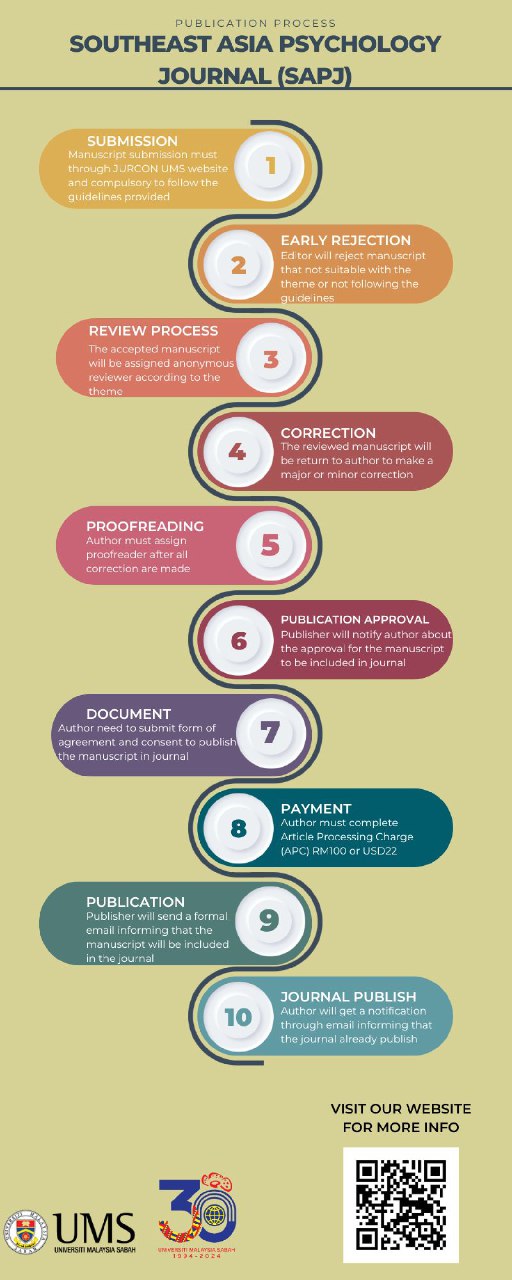PALLIATIVE IDEOLOGY: THE ROLE OF THE JUSTIFYING BELIEF SYSTEM, BELIEF IN A JUST WORLD AND IDEOLOGY CONSERVATIVE TO SUBJECTIVE WELL-BEING OF WORKERS OUTSOURCING
DOI:
https://doi.org/10.51200/sapj.v10i1.4925Keywords:
System Justifying Belief, Belief in a Just World, Conservative Ideology and Subjective Well-BeingAbstract
Someone adopts an ideology because ideology will help psychological needs, interpret and regulate the social world around him. In other words, ideology will help shape the right attitudes, values and societal goals and how to achieve them, so that individuals will be able to understand, predict and even rationalize the rules of society. This study examines the relationship between the system of justifying belief, belief in a just world and conservative ideology on subjective well-being in outsourced workers. A total of 321 outsourced workers currently employed at the company participated in this study. The results showed that the system of justifying belief, belief in a just world and conservative ideology correlated positively and significantly to cognitive subjective well-being aspects. While the affective aspects of subjective well-being were not found to be correlated. This is because the measurement of the affective aspect is more influenced by individual personality. This research indirectly illustrates the palliative function of ideology in helping disadvantaged groups (low economic status) in the face of inequality so that those who are disadvantaged by the system continue to recognize that socio-economic differences are legitimate and fair (support the status quo).
References
Berg, M. and Veenhoven, R. (2010). Income inequality and happiness in 119 nations. In: BentGreve (Ed.) ‘Social Policy and Happiness in Europe’, Edgar Elgar Cheltenham UK, chapter 11, pp 174-194, 2010, ISBN 978-1-84844-574-1.
Bahr, S.J. and Stauss, J.H (1972). Convergent and Discriminant Validity of the New Left Scale and McCLosky Conservatism Scale. Sociological Perspectives. 15(3).
Cosley, B.J., & McCoy, S.K., (2008)., Is ideology palliative? priming meritrocracy and psychological well-being in the face of inequality. American Psychological Association, Convention Presentation.
Dalbert, C. (2001). The justice motive as a personal resource. Dealing with challenges and critical life events. New York: Kluwer Academic/Plenum.
Ditmar, H., & Ditkinson, J. (1993). The perceived relationship between the belief in a just world and sociopolitical ideology. Social Justice Research, 6(3), 232-254.
Eid, L. & Larsen, Randy. (2008). The Science of Subjective Well-Being. New York, Guilford Press.
Farid, M & Lazarus, H. (2008). Subjective well-being in rich and poor country. Journal of Management Development, 27 (10), 341-365.
Henry, P.J., & Saul, A., (2006). The development of system justification in the developing world. Social Justice Research, 19(3), 365-378.
Jost, J.T., & Banaji, M.R. (1994). The role of stereotyping in system justification and the production of false consciousness. British Journal of Social Psychology, 33, 1-27.
Jost, J.T. (1995). Negative illusion: conceptual clarification and psychological evidence concerning false consciousness. Political Psychological, 16, 397-424.
Jost, J.T., & Thompson, E.P. (2000) Group-based dominance and opposition to equality as independent predictors of self-esteem, ethnocentrism, and social policy attitudes among African Americans and European Americans. Journal of Experimental Social Psychology, 36, 209-232.
Jost, J.T., & Hunyady, O. (2002). The psychology of system justification and the palliative function of ideology. European Review of Social Psychology, 13, 111-153.
Jost, J.T., Banaji, M.R., Nosek, B.A. (2004). A decade of system justification theory: accumulated evidence of conscious and unconscious bolstering of status quo, Political Psychology, 25(6), 881-919.
Jost, J.T., Glaser, J., Kruglanski, A.W., & Sulloway, F. (2003). Exceptions that prove the rule: Using a theory and political of motivated social cognition to account for ideological incongruities and political anomalies. Psychological Bulletin, 129, 383-393.
Korys, P. (1999). Conservatism as an answer to liberalism in politic: The case of contemporary Poland. IWM junior visiting fellows conferences, Vol VIII/5, by the author.
Lerner, M. J. (1980). The Belief in a Just World: A Fundamental Delusion. New york: Plenium Press.
Meutia (2006). Reduksi disonansi ideologis sebagai motif untuk menjustifikasi status quo, Thesis Fakultas Psikologi, Universitas Indonesia.
Napier, J.L. & Jost, J.T. (2008). Why are conservatives happier than liberals? Association for Psychological Science Vol 19 No.6.
O’Brien, L.T., & Major, B. (2005). Systems justifying-beliefs and psychological well-being: the roles of group status and identity. Personality and Social Psychology Bulletin, 31(12).
Sidanius, J., & Pratto, F., (1999). Social dominance; an intergroup theory of social hierarchy and oppression. New York: Cambridge University Press.
Wakslak, C.J., Jost, J.T., Tyler, T.R., & Chen E.S. (2007). Moral outrage mediates the dampening effect of system justification on support redistributive social policies. Association for Psychological Science, 18(3), 267-274.








